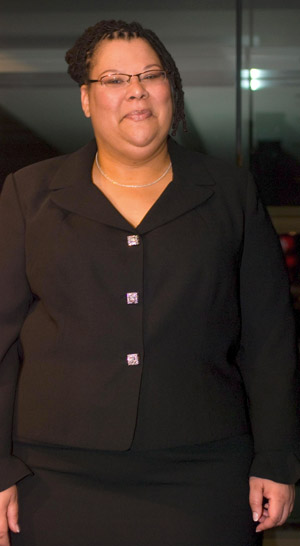Vivian Nixon
Government–sponsored research has consistently concluded that postsecondary education is the most successful and least costly method of preventing crime and that prison-based education is the single most effective tool for lowering recidivism.
Flying in the face of these facts, Congress enacted the1994 Violent Crime Control and Law Enforcement Act effectively dismantling higher education in correctional facilities. States quickly followed suit; the governor of New York, for example, issued an executive order forbidding the use of state tax revenues to support higher education in prison
Willful ignorance of the facts does not even begin to describe the cruel injustice of this denial of opportunity to those caught up in a system where 60% are functionally illiterate and, as Vivian Nixon says, “every sentence ultimately becomes a life sentence because of the collateral consequences.”
While doing time in prison, Nixon worked as a tutor and experienced firsthand the undereducation and miseducation of most of the women prisoners. Whether it was pure happenstance or divine intervention, just days before she was released someone handed her a brochure asking, “Do you want to go to college?” Nixon did and the phone number on the brochure from Community and College Fellowship (CCF) was the first one she dialed on the outside.
Nixon became one of the first fellows in this fledgling program, designed to help formerly incarcerated women achieve economic security for themselves and their families by pursuing college degrees. While working with young people at-risk and completing her Bachelor of Science degree in Human Services Administration, Nixon became a lead organizer for CCF and, in 2004, was asked to become its executive director.
Under her direction, CCF’s budget, staff and program participants have tripled and its funding has swelled from a trickle – two foundations and a handful of individual donors – to a stream of more than 25 institutional funders and 400 individual supporters. CCF has welcomed the first men to the program, started a speaker’s bureau and a theater group and arranged for CCF students to mentor incarcerated youth at Riker’s Island.
To date, more than 130 CCF students have received tuition assistance, tutoring, mentoring and financial counseling and have completed 16 associate’s degrees, 51 bachelor’s degrees, 31 master’s degrees and one doctorate. Of 135 program participants, only 3 have returned to prison
Nixon has put her own formal coursework toward her master’s in public policy on temporary hold and stepped up to take a lead role in efforts to reform the entire field of re-entry programming, policy and legislation. She joins the Coalition for Women Prisoners on lobbying trips to Albany and has forged strong working relationships with The Fortune Society, The Correctional Association of New York, the Center for Community Alternatives, the Community Services Society, Reentry Net and the Prisoner Reentry Institute at John Jay College.
Nixon used her background as an ordained minister of the AME Church to launch Reenter Grace, a project that sends formerly incarcerated colleagues to reach out to African-American faith-based communities, educate them about the disparate impact of US criminal justice policies on people of color and advocate a “Christian response” to mass incarceration, including helping individuals resettle and find jobs in the community and joining efforts to reform a broken justice system.
“We have to change the world, “Vivian Nixon tells CCF fellows, “because we’ve been given a second chance.”
